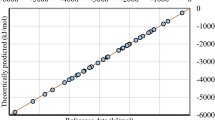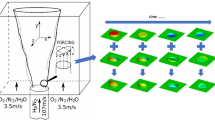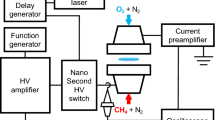Abstract
THEORETICAL flame temperatures and explosion pressures calculated upon the basis of the quantum specific heats (which have been shown to be substantially correct1) are never reached in flames and explosions. Even when measurements of the actual flame temperatures and explosion pressures are postponed for such length of time as to make it certain that chemical combination is complete and full allowance is made for heat loss, there is still a defect of the measured temperatures and pressures below the calculated—a defect which remains constant in amount during the whole of this time. In short, in flames and explosions, definite ceiling temperatures and ceiling pressures are reached which fall short of the calculated temperatures and pressures.
This is a preview of subscription content, access via your institution
Access options
Subscribe to this journal
Receive 51 print issues and online access
$199.00 per year
only $3.90 per issue
Buy this article
- Purchase on Springer Link
- Instant access to full article PDF
Prices may be subject to local taxes which are calculated during checkout
Similar content being viewed by others
References
Phil. Mag., 18, 307 (1934); 22, 513 (footnote) (1936).
Phil. Mag., 21, 280 (1936); 22, 513 (1936); and in press.
NATURE, 130, 930 (1932); and Phil. Mag. (in press).
Phil. Mag., 9, 390 (1930).
NATURE, 138, 930 (1936); also Phil. Mag. (in press).
Proc. South Wales Inst. Eng., 375 (1936).
Author information
Authors and Affiliations
Rights and permissions
About this article
Cite this article
DAVID, W. Combustion Levels. Nature 139, 67–68 (1937). https://doi.org/10.1038/139067a0
Issue Date:
DOI: https://doi.org/10.1038/139067a0
This article is cited by
Comments
By submitting a comment you agree to abide by our Terms and Community Guidelines. If you find something abusive or that does not comply with our terms or guidelines please flag it as inappropriate.



